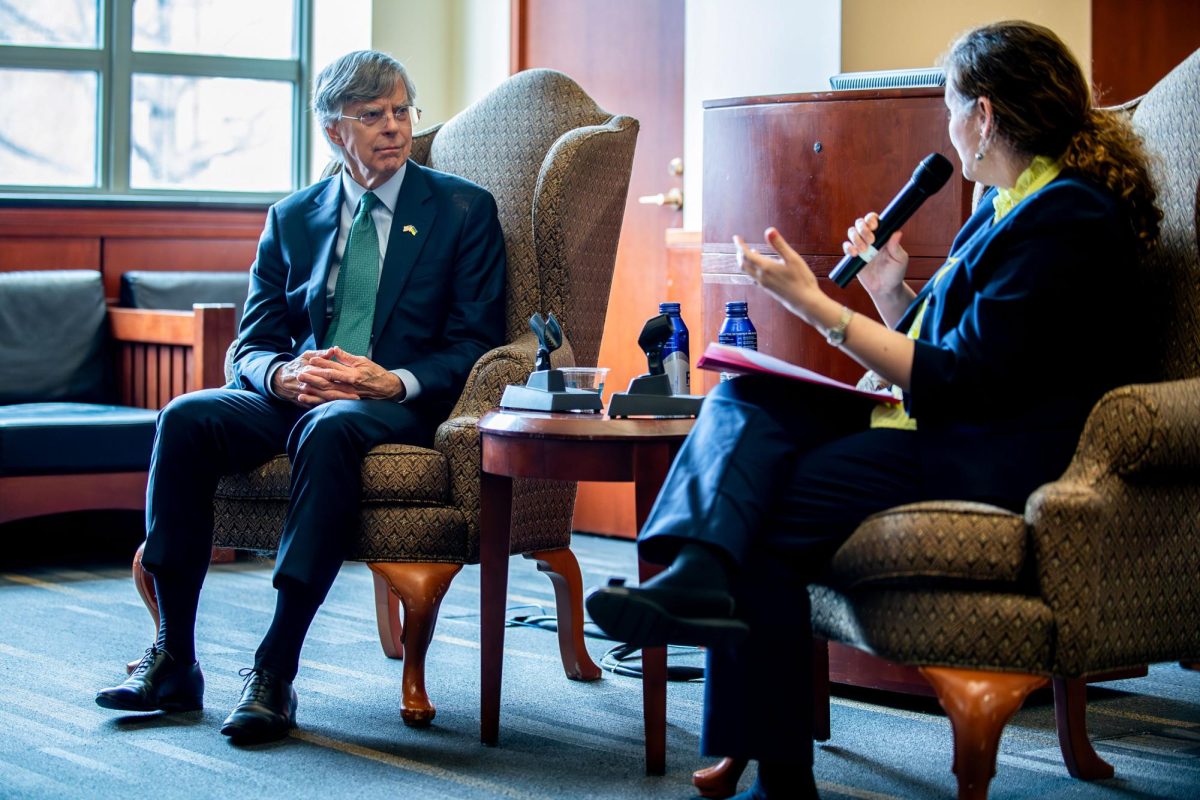A former U.S. ambassador to Ukraine discussed the conditions for peace in country at the GW Law Student Conference Center on Tuesday.
William Taylor, who served as the American ambassador to Ukraine from 2006 to 2009 under Presidents George W. Bush and Barack Obama, discussed the need for continued Western support to secure Ukrainian sovereignty and steps toward an enduring peace in Ukraine following Russia’s invasion of Ukraine in February 2022. GW Law’s International & Comparative Law department hosted the conversation with law school Associate Dean Rosa Celorio.
Taylor said the House of Representatives’ potential passage of the $95 billion aid package for Ukraine and Israel — which passed in the Senate earlier this month and has been rejected by House Speaker Mike Johnson (R-LA) — would signal the United States’ commitment to Ukraine. He said Chinese President Xi Jinping is watching the results of the upcoming House vote on the aid package to determine the extent of American support for Ukraine.
He said Xi doesn’t expect the U.S. to keep providing Ukraine aid because he perceived its withdrawal from Afghanistan in 2021 as a sign of diminishing American power and influence. Taylor, who served as a U.S. diplomat in Afghanistan in 2002, said he sees the Ukraine aid package as a way for the U.S. to emphasize its ability to maintain global influence.
“If that can get a vote in the House, that will demonstrate to the Chinese, to the Ukrainians, to the Russians, and to the Europeans, that they can count on us,” Taylor said.
Taylor graduated from the U.S. Military Academy at West Point in 1969 and completed his graduate studies at Harvard University’s John F. Kennedy School of Government in 1977. He also coordinated U.S. assistance to Eastern Europe and the former Soviet Union in the 1990s and to Tunisia during the Arab Spring. He most recently served as the Chargé d’Affaires to Ukraine between 2019 and 2020 under President Donald Trump.
Taylor said Ukrainian leaders have several priorities that must be negotiated to secure a just and lasting peace, including food security, nuclear security, return of prisoners and the removal of Russian soldiers from Ukraine. He added that Ukrainian officials would have to cede the territory that Russia has occupied so far — about 20 percent of Ukraine’s land — to begin negotiation conversations between the countries.
He said Russian President Vladimir Putin continues to assert that Ukraine is not a sovereign nation and that Russian leaders annex the country entirely. Ukrainian leaders do not want any negotiated ceasefire or compromise that allows Russia to stay in Ukraine, Taylor said.
“They know what happens to Ukrainians who live under Russian occupation, they saw them butchered, and it’s horrible. They don’t want that for their Ukrainian compatriots,” Taylor said. “So Ukrainians are not willing to have a peace at any price, with a compromise that would cede a fifth of their country to the horrors of Russian occupation.”
Taylor said the U.S. and its allies continue to affirm their support for Ukrainian sovereignty because of Putin’s increasing authoritarianism and repression of opposition, pointing to the recent mysterious death of Alexei Navalny, an incarcerated opposition leader and one of Putin’s staunchest critics who opposed the war in Ukraine. He said Ukraine has gained greater allyship with countries in international organizations like the European Union and NATO because of its positions against Russian authoritarianism.
“The values that the European Union represents to Ukrainians are the goal, are where they want to be,” Taylor said. “They are the values of the Ukrainians, and they want to join that community.”





